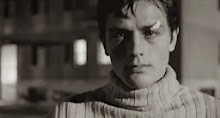O Cineclube FDUP regressa esta Terça, dia 10 de Março, com o filme Peregrinação Exemplar (Au Hasard Balthazar, 1966), de Robert Bresson. Pelas 18h15, na sala 0.01 da FDUP. A entrada é, como habitualmente, livre. Bons filmes!
Robert Bresson is one of the saints of the cinema, and "Au Hasard Balthazar" (1966) is his most heartbreaking prayer. The film follows the life of a donkey from birth to death, while all the time living it the dignity of being itself--a dumb beast, noble in its acceptance of a life over which it has no control. Balthazar is not one of those cartoon animals that can talk and sing and is a human with four legs. Balthazar is a donkey, and it is as simple as that.
(...)
Bresson's most intriguing limitation is to forbid his actors to act. He was known to shoot the same shot 10, 20, even 50 times, until all "acting" was drained from it, and the actors were simply performing the physical actions and speaking the words. There was no room in his cinema for De Niro or Penn. It might seem that the result would be a movie filled with zombies, but quite the contrary: By simplifying performance to the action and the word without permitting inflection or style, Bresson achieves a kind of purity that makes his movies remarkably emotional. The actors portray lives without informing us how to feel about them; forced to decide for ourselves how to feel, forced to empathize, we often have stronger feelings than if the actors were feeling them for us.
Given this philosophy, a donkey becomes the perfect Bresson character. Balthazar makes no attempt to communicate its emotions to us, and it comunicates its physical feelings only in universal terms: Covered with snow, it is cold. Its tail set afire, it is frightened. Eating its dinner, it is content. Overworked, it is exhausted. Returning home, it is relieved to find a familiar place. Although some humans are kind to it and others are cruel, the motives of humans are beyond its understanding, and it accepts what they do because it must.
(...)
Roger Ebert, ali: http://www.rogerebert.com/









Sem comentários:
Enviar um comentário